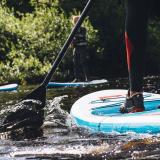The advice and resources on this page have been provided for public information and to assist the water sector with community water planning in the absence of official NHMRC advice.
The advice and resources listed below relate to water industry, state, national and international information on water planning, that was previously cited in the Community Water Planner (now decommissioned). Please note that some resources may have been rescinded or superseded by other publications and have been retained for reference only. Please read our Disclaimer for more information. For further information on community water planning issues please contact your relevant state or territory health authority or drinking water regulator.
Australian Water Association (AWA)
AWA is the peak body representing water professionals in Australia. Independent and not-for-profit, AWA promotes sustainable water management through collaboration, advocacy and professional development. The AWA website includes a range of relevant publications as well as specialist networks on various water related issues.
Centre for Appropriate Technologies (CfAT)
The Centre for Appropriate Technology (CfAT) works to secure sustainable livelihoods for communities of Indigenous people through appropriate technology. CfAT provides information, knowledge and practical services across a range of areas including energy, housing and infrastructure, water, waste, telecommunications, transport and technical skills development. CfAT utilises evidence based and applied problem solving approaches to assist communities of Indigenous people to access the information, services and skills required to live safe and happy lives. Please visit the CfAT website to access relevant resources and information.
Resources previously cited in the Community Water Planner:
- CAT: Harvesting Rainwater that falls on country - Planning for rainwater tanks in remote Australia
- CAT: How to look after your rainwater - Pictorial Manual
- CAT: Remote Controlled Waste - An Introduction to Waste Management and Appropriate Technology in Remote Aboriginal Communities
- CAT: Bush Tech #3 - Operation Desert Stormwater Harvesting
- CAT: Bush Tech #4 - Rainwater Harvesting
- CAT: Bush Tech #17 - Landfill Design
- CAT: Bush Tech #19 - Maintaining your tip
- CAT: Bush Tech #21 - Water Bores
- CAT: Bush Tech #22 - Used Oil
- CAT: Bush Tech #24 - Managing liquid fuel risk
- CAT: Bush Tech #35- Protecting your Water Places
Department of Climate Change, Energy, the Environment and Water
The Department of Climate Change, Energy, the Environment and Water protects Australia’s natural environment and heritage sites. It also aims to help Australia respond to climate change and carefully manage our water and energy resources. The new department has been established to deliver on the Government’s climate change and energy agenda and protect Australia’s environment and water resources.
Resources previously cited in the Community Water Planner:
- Blue-green algae and Commonwealth Environmental Water
- Chemicals Management
- Review of the application of landfill standards
- Water Policy and Resources
Department of Health, Disability and Ageing
The Department of Health, Disability and Ageing develops and delivers policies and programs and advises the Australian Government on health, disability and aged care. The Department also provides support to the Environmental Health Standing Committee (enHealth). EnHealth brings together expertise from Australian, state and territory health departments, research councils and their New Zealand counterparts. Please visit the enHealth webpage for environmental health publications including relevant water quality guidance.
Resources previously cited in the Community Water Planner:
- Environmental Health Practitioner Manual - A resource manual for Environmental Health Practitioners working with Aboriginal and Torres Strait Islander Communities
- Guidance on the Use of Rainwater Tanks
International Water Association (IWA)
The International Water Association (IWA) is a global reference point for water professionals, spanning the continuum between research and practice and covering all facets of the water cycle. The IWA website includes a range of relevant publications as well as specialist networks on various water related issues.
Resources previously cited in the Community Water Planner:
- IWA: Bonn Charter for Safe Drinking Water
National Indigenous Infrastructure Guide
The National Indigenous Infrastructure Guide was been compiled by the Centre for Appropriate Technology (CfAT) and was funded by the former Australian Government Department of Families, Housing, Community Services and Indigenous Affairs (FaHCSIA). The Guide provides practical guidance on installing and maintaining infrastructure that is appropriate and sustainable for remote Aboriginal and Torres Strait Islander communities. It has been developed to assist people working with infrastructure in Indigenous communities –community managers, essential service officers, government officers, planners, service providers, contractors and the communities themselves. Please visit the CfAT website to access available resources on the Guide.
Resources previously cited in the Community Water Planner:
- National Indigenous Infrastructure Guide - Community Involvement
- National Indigenous Infrastructure Guide - Energy
- National Indigenous Infrastructure Guide - Storm Water
- National Indigenous Infrastructure Guide - Telecommunications
- National Indigenous Infrastructure Guide - Transport
- National Indigenous Infrastructure Guide - Waste
- National Indigenous Infrastructure Guide - Waste Water
- National Indigenous Infrastructure Guide - Water
- Remote Community Water Management
North Australian Indigenous Land and Sea Management Alliance Ltd (NAILSMA)
North Australian Indigenous Land and Sea Management Alliance Ltd (NAILSMA) are currently working on a broad range of projects with Traditional Owners, remote communities and land and sea management practitioners through collaborative and scientific partnerships across north Australia.
Operation & Maintenance Network
The Operation and Maintenance Network (OMN) aims to raise awareness of O&M practices, and help improve the performance and efficiency of water and sanitation systems. The Network focuses on not only on core technological issues, but a series of cross-cutting elements such as design, performance, training and promotional materials, institutions and management, community involvement and monitoring. This website and the tools found here are designed to promote information and expertise exchange on this crucial topic.
Specialised State Government Water Websites
State Government regulate and legislate water requirements for their state. In addition, they are a source of publications and fact sheets. Please contact your relevant state and territory health department and/or drinking water regulator for more information on local regulations and requirements.
Resources previously cited in the Community Water Planner:
- Guidelines for the Siting, Design and Management of Solid Waste Disposal Sites In the Northern Territory (Northern Territory Environmental Protection Agency)
- Protect our Waters, Protect our Health - guide (Victorian Department of Health and Human Services)
- Stormwater information (Environmental Protection Authority Victoria)
Te Whatu Ora (Health New Zealand) and Taumata Arowai (Water Services Authority)
Taumata Arowai is an independent water services regulator for Aotearoa New Zealand, becoming fully operational as the drinking water regulator when the Water Services Act 2021 came into effect on 15 November 2021. The New Zealand Ministry of Health previously served as the regulator and remains as the organisation in charge of drinking water policy, working closely with Taumata Arowai.
Please visit the Te Whatu Ora and Taumata Arowai websites for more information and available resources.
Resources previously cited in the Community Water Planner:
• A Framework on How to Prepare and Develop Water Safety Plans for Drinking-water Supplies
• Pathogens and Pathways, and Small Drinking-water Supplies
• Public Health Risk Management Plan Guides for Drinking Water Supplies: Water Safety Plan Guides for Drinking Water Supplies
• Small Drinking-water Supplies - New Zealand Ministry of Health
United States Government Water websites
United States Government water information resources previously cited in the Community Water Planner:
- Sanitary Survey Guidance Manual for Groundwater Systems (United States Environmental Protection Agency)
- Sanitary Surveys of Drinking Water Systems (Washington State Department of Health)
Water Research Australia (WaterRA)
Water Research Australia (WaterRA) is a national research centre established to succeed the CRC for Water Quality and Treatment. WaterRA undertakes collaborative research of national application on drinking water quality, recycled water and relevant areas of wastewater management. The main focus of the research program is on urban water issues related to public health and acceptability aspects of water supply, water recycling and aspects of waste water management. WaterRA also has an Education Program, utilising the most successful elements of the CRC Program. Please visit the WaterRA website for relevant resources available to members and subscribers, including publicly accessible publications.
Resources previously cited in the Community Water Planner:
- Blue-Green Algae: Their Significance and Management Within Water Supplies
- Chemicals of Concern in Wastewater Treatment Plant Effluent: State of the Science in Australia
- Disinfection By-Products and Health Effects
- Natural Organic Matter in Drinking Water: Problems and Solutions
- Public Health Aspects Of Rainwater Tanks In Urban Australia
WaterRA: Health Stream Newsletter
Health Stream is the public health newsletter of Water Research Australia. This website provides a searchable archive of the Health Stream newsletters which contain a wide range of information and analysis for water and health professionals.
Water Services Association of Australia (WSAA)
Water Services Association of Australia (WSAA) is the peak body of the Australian urban water industry and has offices in Melbourne and Sydney. Its 34 members and 26 associate members provide water and wastewater services to approximately 16 million Australians and many of Australia's largest industrial and commercial enterprises. WSAA was formed in 1995 to provide a forum for debate on issues of importance to the urban water industry and to be a focal point for communicating the industry's views. Please visit the WSAA website to access available resources and information.
Resources previously cited in the Community Water Planner:
- WSAA Demand Management Guideline 2008
World Health Organization (WHO)
The World Health Organization (WHO) is the directing and coordinating authority for health within the United Nations system. It is responsible for providing leadership on global health matters, shaping the health research agenda, setting norms and standards, articulating evidence-based policy options, providing technical support to countries and monitoring and assessing health trends. Visit the WHO website for available publications on water quality and water safety planning:
Resources previously cited in the Community Water Planner:
- Arsenic, drinking-water and health risk substitution in arsenic mitigation: A discussion paper
- Chemical hazards in drinking water (list of fact sheets)
- Chemical safety of drinking-water: assessing priorities for risk management
- Domestic water quantity, service level and health
- Guidelines for drinking-water quality - Chemical fact sheets
- Technical Notes on WASH in Emergencies
- Toxic cyanobacteria in water: A guide to their public health consequences, monitoring and management
- Water Safety Plan Manual: Step-by-step risk management for drinking-water suppliers
- WSPortal: health through water
- Water treatment and pathogen control: Process efficiency in achieving safe drinking water


